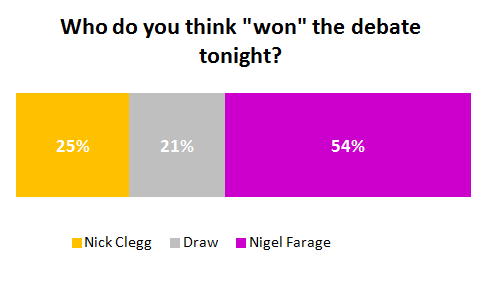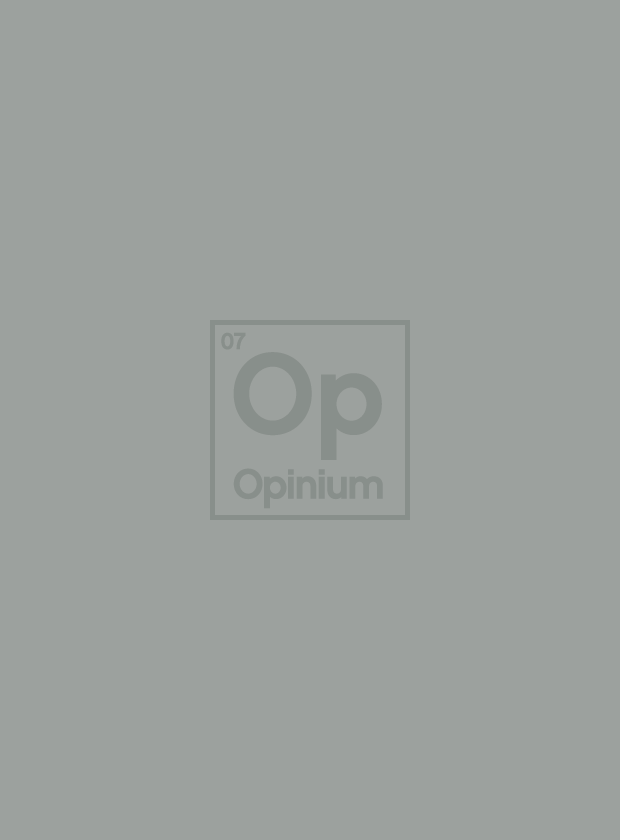A win for Farage but views on Europe may not change much
A win for Farage but views on Europe may not change much

Farage was the clear winner among Conservative voters (56% vs. 28%) and Labour voters (43% vs. 34%). While each leader carried the voters of their own parties, the enthusiasm was with the UKIP leader; just 68% of Liberal Democrats said Clegg won vs. 95% of UKIP voters backing Mr Farage.
When asked whether the debate had made them more positive or negative about each man, 40% said that their views of Clegg were “about the same” while 37% were more negative and 22% more positive. For Farage, 45% say the debate has made them more positive vs. 19% more negative and 35% “about the same”.
Did the debate change views on Europe?
When we asked what impact the debate had on how they viewed the European Union, 39% said that the debate had made them more likely to want to leave the EU vs. just 15% who said it made them more likely to want to stay. 37% said that their views had not changed as they already wanted to leave or stay.

However, when asked how they would vote in a referendum on Europe tomorrow, views were very similar to the last time Opinium asked this question in mid March. 50% would vote to leave the European Union while 39% would vote to stay while the figures from the March poll are 47% voting to leave and 38% voting to stay. These figures aren’t directly comparable as the sample definition and weighting are slightly different but they do appear similar.
Impact on 2015 debates
Looking at debates in the future, 87% of our sample said that there should be party leader debates before the 2015 general election, as there were in 2010, and Mr Farage looks to have booked himself a podium. We asked which party leaders should take part in debates in 2015 and the results are below:

The leaders of the various political parties fall into two distinct groups when it comes to who should take part in the 2015 debates with the UKIP leader coming closer to the leaders of Labour, the Conservatives and the Liberal Democrats than to the leaders of the other minor parties.
However, there was some support for a German-style two-tiered debate where the two main candidates for prime minister (likely David Cameron and Ed Miliband) square off in a debate without any other leaders while the leaders of smaller parties such as the Liberal Democrats and UKIP have a separate debate. 47% supported this arrangement while 28% opposed it although the real choice of course depends on what the party leaders and the television channels are able to negotiate.
If forced to choose
The main bit of good news for Nick Clegg is that when respondents were asked who they preferred for prime minister, Mr Clegg or Mr Farage, with no other options (or “don’t know” or “none” options) given the result is much closer with 48% for Mr Clegg vs. 52% for Mr Farage.

Opinium Research carried out an online survey of 1,041 UK adults aged 18+ from 2nd to 3rd April 2014. Opinium screened our nationally representative panel of respondents and those who opted in were asked to watch the debate and answer a short survey upon completion. Results have been weighted to be representative of the total UK adult population according to age group, gender, region and voting intention to match Opinium?s most recently published political polling.
Interview Method and Sample
This survey is conducted online by CAWI (computer aided web interviewing), using Opinium?s online research panel of circa 30,000 individuals. This research is run from a representative sample of GB adults (aged 18+ in England, Scotland and Wales). The sample is defined from pre-collected registration data containing gender, age (18-34, 35-54, and 55+), region (North East, North West, Yorkshire and Humberside, East Midlands, West Midlands, East of England, London, South East, South West, Wales, and Scotland), working status and social grade to match the latest published ONS figures.
Opinium also takes into account differential response rates from the different demographic groups, to ensure the sample is representative.




